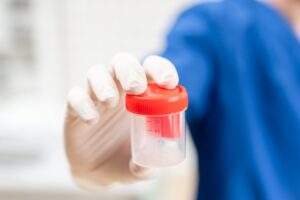A semen analysis is the first line of testing for male fertility. This measures the quantity and basic functions of the sperm as follows:
- Volume: the ejaculate should be 2ml or more in volume
- Sperm count: this is the number of sperm and should be higher than 40 million sperm or 20 million sperm per ml
- Motility: this indicates how well the sperm can swim and over 50% of sperm should be good swimmers
- Morphology: this indicates that the sperm are well formed and not abnormal looking which might impede their ability to swim or penetrate the egg. There are usually a high number of abnormal forms in the sample, this is quite normal. Depending on how this is measured, the normal forms should be above 4% or perhaps higher than this depending on the lab
- Anti-sperm antibodies: these are antibodies that bind to the sperm which interferes with their function. It is important to have this below 50%
DNA Fragmentation Test
Sperm deliver paternal DNA to the egg during fertilization. It is important that this DNA is of optimum quality to ensure the healthy development of the embryo and foetus. Elevated DNA fragmentation is linked with infertility and miscarriage.
Men with an abnormal semen analysis may have increased DNA fragmentation also. However, one in four men with a completely normal semen analysis will have increased DNA fragmentation. Along with other experts in the field, we highly recommend carrying out this test along with the regular semen analysis at initial investigation.
Read more about male fertility and how we can help here and read more on our research in this area including a published medical paper here
Who should take this test?
- Anyone is trying to conceive
- Anyone who has already had a semen analysis but is still trying to conceive
- Men going through assisted reproduction; IUI, IVF, IVF/ICSI
- After failed attempts at assisted reproduction or recurrent miscarriages
Test Procedure
- A DNA fragmentation test can be carried out at home with an at-home test kit; please make an enquiry


